It's the heat of summer here in North America, so it's time to reprise our summer reading list with this year's choices. Some are recent releases; others are older favorites and perhaps new to you. Regardless of age, they're what our open source authors are reading this summer and would like to recommend to you.
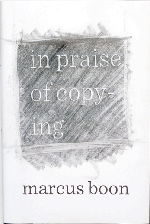 In Praise of Copying
In Praise of Copying
by Marcus Boon
recommended by Bryan Behrenshausen
Counterfeit designer handbags. MP3 files. Academic manuscripts. Hiphop tracks. Memes. Themepark rides. Organisms. Copies, all of them. And yet all of them originals in their own right. In this book, Marcus Boon turns to each of these original copies to complicate occasionally naive and often misguided understandings of a practice we call "copying."
Boon's aims here are not legal or even ethical–though he readily admits that legal and ethical matters are inextricably bound up with contemporary notions of "the copy." Instead, for Boon the question of the copy is an ontological one; it concerns the very nature of being itself. Confronting both the copy and the practice of copying involves wrestling with and rethinking some distinctions we take for granted–distinctions between original and reproduction, authentic and inauthentic, legitimate and illegitimate, self and other, and, ultimately, being and non-being.
With a conversationally academic style, Boon puts ancient and contemporary philosophers, political economists, religious thinkers, and pop pundits in conversation (you'll be amazed by how much Louis Vuitton and Plato can learn from one another, how easily Jon Stewart and Henri Bergson get along) to explore mimesis, the process of creative replication he claims is fundamental to the entire universe.
In Praise of Copying is licensed under a Creative Commons BY-NC-SA 3.0 license, so you can download your very own original copy of the copied original.
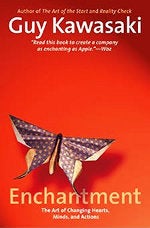 Enchantment
Enchantment
by Guy Kawasaki
recommended by Jeff Mackanic
Take a look at this image.
Here is the story behind this picture: Richard Branson and Guy Kawasaki are in the speakers lounge during a conference in Moscow. Richard asks Guy if he ever flew on Virgin. Guy responded that he does not since he is a United Airlines customer. Then Richard got on his knees and gave Guy a shoeshine with his coat. Wow--that is enchantment !
Guy writes that proximity is critical to connect with people, and you need to connect with someone if you want to enchant them. Guy tells a quick story about Zappos where they turned the employee entrances and exits into emergency-only exits so that people are forced to bump into each other in the main entrance. What a great idea to foster interaction and community.
Great summer reading book. Easy to read, entertaining, and very insightful.
This book is Enchanting!
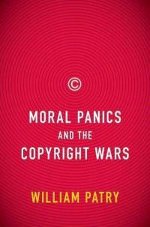 Moral Panics and the Copyright Wars
Moral Panics and the Copyright Wars
by William Patry
recommended by Rob Tiller
Moral Panics and the Copyright Wars, by William Patry, argues that the legitimate policy debate over the scope of copyright has been badly distorted by inflammatory rhetoric.
An example: the RIAA brands copying recorded music without permission for personal use as “piracy.” Using such language excites emotions and makes it appear that the issue is a matter of right and wrong, rather than an issue of economics and public policy.
Patry covers considerable legal, historical, and philosophical ground, and gives a lively account of open innovation and the continuing effort of incumbent firms and associations to squelch it.
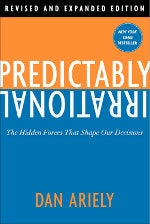 Predictably Irrational, Revised and Expanded Edition: The Hidden Forces That Shape Our Decisions
Predictably Irrational, Revised and Expanded Edition: The Hidden Forces That Shape Our Decisions
by Dan Ariely
recommended by Lori Mehen
Why are we so excited about free stuff, even if we know it will just sit in a drawer or get thrown out later? Why do we convince ourselves that an expensive wine tastes better than a cheap one? Why are we so sure an expensive drug is more effective than a cheap one?
Professor Dan Ariely's book takes you on a tour of his numerous ingenious psychological experiments that unmask the ways expectations, emotions, social norms, and context trick us into predictably irrational decision-making.
If you're curious about the way we make decisions this will be a real eye-opener.
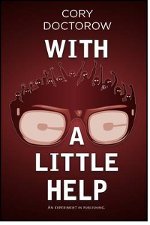 With A Little Help
With A Little Help
by Cory Doctorow
recommended by Bryan Behrenshausen
By cracking Cory Doctorow's latest collection of short fiction, you won't just be enjoying excellent science fiction. You'll also be participating in an important experiment.
Doctorow has established himself as a master of near-future speculation and, true to form, his recent work demonstrates a keen sensitivity to social and technological trends–trends that, accelerated ever so slightly, architect a future already disconcertingly familiar. One piece, "Scroogled," is a haunting (and frustrating, if only because it hits so close) warning about the unchecked diffusion of information-gathering search technologies. Another, "Constitutional Crisis," charts the rise and fall of an MMORPG players' guild that tries to turn a profit as a for-hire outfit (the story unfolds as a series of amendments to the guild's constitution). Themes from Doctorow's recent novels–notably Little Brother and Makers–are salient here, and Doctorow provides context for each tale by narrating its history.
With A Little Help is the first of Doctorow's books to be entirely self-published. Readers can pay any price they choose (they can also choose to pay nothing at all) for a Creative Commons licensed ebook in a number of open formats. It's also available as a printed book in two forms: a paperback from Lulu (with one of four covers Doctorow commissioned), or as a premium hardcover, which is hand-bound and includes an SD card containing both a complete electronic text of the book and the full audiobook (itself also licensed as a Creative Commons download available at no cost). Doctorow is encouraging readers to report any typos they find while reading; corrected editions of the electronic book appear frequently.
In this way, With A Little Help–the object, the project–is as much a speculation about the future of the book publishing industry as it is a set of ruminations on privacy, control, intellectual property, and economics. In a series for Publisher's Weekly, Doctorow reports regularly on his adventure in self-publishing. But Doctorow and his readers aren't the only parties learning as they go. With A Little Help concludes with an essay ("I'm Only In It For the Money") by Doctorow's literary agent, now also an unlikely speculator who wonders aloud about what his client's experiment portends for future relationships between authors, agents, and audiences.
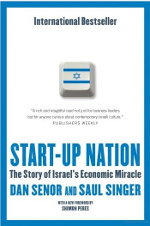 Start-Up Nation: The Story of Israel’s Economic Miracle
Start-Up Nation: The Story of Israel’s Economic Miracle
by Dan Senor and Saul Singer
recommended by DeLisa Alexander
Dan Sensor and Saul Singer explore the way that the tiny and embattled nation of Israel moved from its position as a struggling economy to being considered the most innovative and entrepreneurial country in the world today. In reading this interesting story filled with history, I learned something unexpected: There is a strong correlation between the Israeli culture and the open source way.
Sensor and Singer highlight the attributes of Israel’s culture that helped Israel to ascend to such a strong position including meritocracy, disruptive innovation, passionate debate, initiative, sharing of ideas and “chutzpah”. While I have long considered the open source way the best path to creativity, from reading this page-turner, I have also concluded that the open source way is a path to creating an entrepreneurial system.
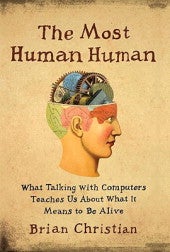 The Most Human Human: What Talking with Computers Teaches Us About What it Means to Be Alive
The Most Human Human: What Talking with Computers Teaches Us About What it Means to Be Alive
by Brian Christian
recommended by Rob Tiller
The Most Human Human: What Talking with Computers Teaches Us About What it Means to Be Alive, by Brian Christian, uses the Turing test of artificial intelligence as a jumping off place for a wide-ranging discussion of our relationship to technology. The test invites artificial intelligence programs to converse with human judges and earn the title the Most Human Computer. The author competed in a parallel competition to be designated the Most Human Human. The book is a lively account of these early days of artificial intelligence, with thought-provoking speculations about human nature.
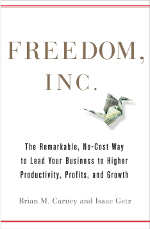 Freedom, Inc.: Free Your Employees and Let Them Lead Your Business to Higher Productivity, Profits, and Growth
Freedom, Inc.: Free Your Employees and Let Them Lead Your Business to Higher Productivity, Profits, and Growth
by Isaac Getz
recommended by Rebecca Fernandez
Every once in a while, you stumble across a book that's so interesting, you can't begin to imagine why no one else has ever heard of it. Freedom, Inc. is that book.
Co-authored by a journalist and a management professor, Carney and Getz present case studies and commentary on businesses that are successfully giving their employees (you guessed it) freedom to do their jobs in ways that make sense to them. This book is guaranteed to stretch the imagination of managers everywhere, offering many paths to workplace enlightenment that are far more accessible than the classic Google 20/80 arrangement.
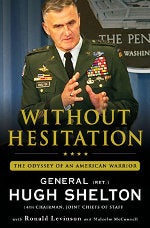 Without Hesitation: The Odyssey of an American Warrior
Without Hesitation: The Odyssey of an American Warrior
by General Hugh Shelton
recommended by Jason Hibbets
Last February, opensource.com hosted a webcast with General Hugh Shelton, former Chairman of the Joint Chiefs of Staff. After listening to Shelton talk about his experience in the U.S. military, recovering from a life-threatening injury, and his leadership style, I wanted to learn more about "The General," as my five-year old son has come to call the book.
I already had a connection to General Shelton, as I was an Army brat at Ft. Bragg during one of his many deployments to the base. I was too young at the time to pay attention, but I'm glad I plowed through this book. I was worried that the military jargon would distract from the book, but it wasn't that bad.
If you want to read the story of someone who climbed the ranks to the highest level in the U.S. military, led from the front, and advocated for the men and women of the U.S. Armed Forces, you'll get great insight from General Shelton. I was impressed how he shared the struggles of a military family to the honest truth about some of the military operations and plans from the past 20 years. Particularly, Desert Storm, 9-11, and the hunt for terrorists like Usama bin Laden.
It's not really a memoir about the military; it's the life story of a man who lived and spoke the values that they believe in. Values like honesty, integrity, and teamwork--many of which share a common theme with the open source way.
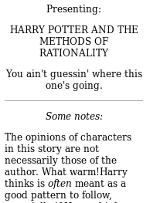 Harry Potter and the Methods of Rationality
Harry Potter and the Methods of Rationality
by Eliezer Yudkowsky aka "Less Wrong"
recommended by Ruth Suehle
This is the dessert course on your summer reading menu. You've finished reading the non-fiction business books and gotten to the end of fourteen years of Harry Potter books and movies. Here's where you go next.
Methods of Rationality reimagines Harry Potter’s life at Hogwarts as if he had been raised not by the obnoxious Dursleys, but by a warm and loving Oxford professor. Or as the introduction to chapter 22 puts it:
HARRY JAMES POTTER-EVANS-VERRES grew up in a house filled to the brim with books. He once bit a math teacher who didn’t know what a logarithm was. He’s read Godel, Escher, Bach and Judgment Under Uncertainty: Heuristics and Biases and volume one of The Feynman Lectures on Physics. He wants to discover the laws of magic and become a god.
And what does it have to do with opensource.com? A few things. I first heard about MoR when I attended Open Source Bridge, and it seemed like every panel I went to managed to work in a reference to this story. Fan fiction is also an interesting and debated copyright issue. J. K. Rowling has long approved of this aspect of fandom, as long as it doesn't put her young characters in explicit situations.
Although I've never been a fanfic fan, I've now read all 72 chapters, and I highly recommend that you do as well. It's a great read to pull up on your phone when you need to pass some time. But I should warn you--it's an unfinished work, and new chapters are still being released. Accio rationality!

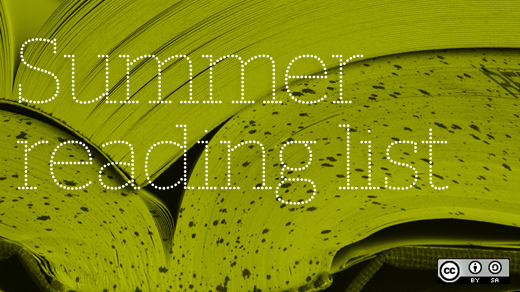





8 Comments